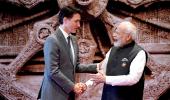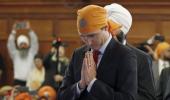As India's diplomatic tensions with the Land of the Maple Leaf escalate, so do the anxieties of countless Punjabis.

Prime Minister Narendra D Modi teases Ella Grace, Canadian Prime Minister Justin Trudeau's daughter, at their meeting in New Delhi in 2018. Photograph: @narendramodi/Twitter
Nestled in the heart of the royal city of Patiala, Leela Bhawan Square is more than just a location; it's a gateway to a regal lifestyle for locals.
This thriving square has become a symbol of hope for those aspiring to venture abroad, as it hosts a multitude of International English Language Testing System (IELTS) academies and visa agencies.
This once lively square, where cheerful conversations and hopeful farewells were the norm, now finds itself immersed in uncertainty, all due to India's deteriorating relations with Canada -- a destination seven out of 10 Punjabis pursue for foreign education and employment opportunities, according to travel and visa agencies.
As India's diplomatic tensions with Canada, led by Prime Minister Justin Trudeau, continue to escalate, so do the anxieties of countless Punjabi individuals.
"Mainu lagada Modi (Narendra Modi) ate Trudeau sade supne di bali denage (I think Modi and Trudeau will sacrifice our dreams)," says Armaanjeet Singh, a 19-year-old who is preparing for the IELTS exam at Hope Institute.
Armaanjeet's father sold two acres of land a year ago to fulfil his son's dream of going to Canada.
Although he has also applied to Australian universities, Canada holds a special place in his heart because his cousin resides there.
"Nobody from my family is there in Australia. Canada would have been like a second home to me," he explains.
Canada isn't just a second home for the Singhs; it's home to hundreds of thousands of Punjabis.
Canada has the largest Sikh population outside of India, with approximately 950,000 Punjabi Canadians making up roughly 2.6 per cent of the country's population.
The influence of this community is so evident that in 2019, 18 Sikhs became members of Canada's House of Commons.
Gurpreet Singh (name changed on request), who has plans to commence his studies at a college in British Columbia in January, finds himself in a state of uncertainty.
"I have already paid my fees, but I am unable to reach the college administration," says Gurpreet, adding, "I find it difficult to sleep as uncertainty looms over the dream I've been working towards."
Gurpreet emphasises that both governments should permit students who have secured admissions to travel, as their prospects hang in the balance.
While students have alternative options like the US, Australia, and New Zealand, they favour Canada due to lower tuition fees and living expenses.
The cost of pursuing a bachelor's degree in Canada typically ranges from Rs 50 lakh (Rs 5 million) to Rs 60 lakh (Rs 6 million), whereas in the US, the expenses can amount to twice that amount.
Additionally, the prospect of obtaining a work permit and permanent residency in Canada is notably more accessible compared to these other countries, making it an attractive choice.
According to the data from Immigration, Refugees and Citizenship Canada, the number of Indians becoming permanent residents in Canada rose from 32,828 in 2013 to 118,095 in 2022 -- a 260 per cent increase.
Jaswant Brar, a resident of Mohali, is deeply concerned about his daughter, who is currently pursuing a computer science degree in Canada.
He has taken out a substantial loan with the hope that she will establish herself abroad and help him pay it back.
"Politicians may be battling for their interests, but it's us who will bear the consequences of this," Brar says with a whiff of worry.
Brar also implores both governments to accelerate efforts towards resolving the ongoing issue, expressing his concerns about his daughter's prospects of obtaining permanent residency.
Tensions between the two countries intensified when Trudeau, during an emergency session of Canadian Parliament, stated that 'agents of the Indian government' had killed Hardeep Singh Nijjar, a Khalistan supporter who was labelled a terrorist by the Indian government in 2020.
For students currently residing in Canada, the situation appears relatively stable.
"We have not faced any scrutiny here, but the way this matter is dealt with, however, I'm afraid people might start categorising us as terrorists. We are here in search of a better life, not Khalistan," says a Sikh student who is studying at a top university in Canada.
Parry Sandhu, founder of Global Guide, a consultancy that assists Punjabis in obtaining visas, believes the present circumstances will eventually find stability.
He asserts that Canada has to support Indians as its economy relies significantly on Indian immigrants, who contribute approximately 40 per cent to the nation's economic growth.
"While the current situation may benefit a select few, it has the potential to adversely affect millions of Indians," Sandhu says.
- Of the 32,100,340 overseas Indians, 5.26% (1,689,055) are in Canada. These include 178,410 Non-Resident Indians and 1,510,645 Persons of Indian Origin, according to the data available from the ministry of external affairs.
- In 2022, of the estimated 1,324,954 Indian students abroad, 13.83% (183,310) were in Canada, according to MEA data.
- Canada accounted for 5.3% (80,437) of foreign tourist arrivals in India during 2021, according to India Tourism Statistics, 2022.
Feature Presentation: Aslam Hunani/Rediff.com












 © 2025
© 2025